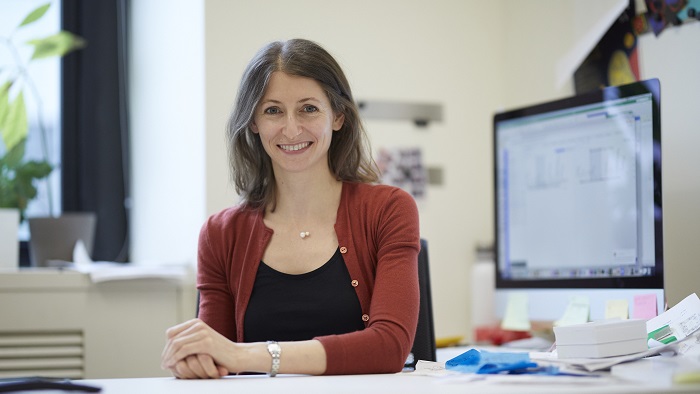Ms. Kory, you are an Assistant Professor at the Harvard T.H. Chan School of Public Health in Boston. What research questions are you currently working on?
I am currently working on finding out how mitochondria, the power plants and metabolic spaces of our cells, exchange metabolic products and enzymatic co-factors with the rest of the cell. Mitochondria play an important role in central biological processes. In order to fulfill their diverse functions, mitochondria constantly exchange molecules with the rest of the cell. This exchange takes place via transport proteins in the inner mitochondrial membrane. We want to understand exactly how these processes take place at the molecular level. We are also investigating the role that transport processes in mitochondria play in ageing processes and in diseases such as diabetes, cancer and neurodegenerative diseases.
You work at a university facility named after you, the "Kory Lab". What is behind it and who do you work with there?
I lead an independent research group at the Harvard T.H. Chan School of Public Health. Our group consists of postdoctoral and research associates, PhD candidates, and students from around the world. My lab is part of a department at the Harvard T.H. Chan School of Public Health that focuses on metabolic processes at the molecular level and their control in ageing-related diseases. Therefore, we also collaborate a lot with other groups in our department and other institutes at Harvard and MIT. The research focus of our lab is evolving in the direction where my team and I see the opportunity to contribute new knowledge.
You come from Heidelberg and studied molecular biology at LMU Munich. What academic path or what decisions led you to the USA?
As I became particularly interested in the regulation of metabolic processes at the cell biological level during my studies at LMU Munich, and the Gene Center at LMU was mainly specialized in structural biology at the time, I sought research experience outside the university early on, for example at ETH Zurich and the Max Planck Institute of Biochemistry in Martinsried. I first ventured to the USA for my Master's thesis. There I had the opportunity to work for nine months in a world-leading laboratory at the Whitehead Institute/MIT. Ultimately, I was attracted by the way fundamental questions are asked in research here and new methods are developed and applied to answer them. That's why I decided to do my PhD and postdoc on the East Coast. When I applied for professorships and independent group leader positions, I saw a tenure track position in Boston as a unique opportunity not only to build up my research program, but also to develop it in new directions in the long term.
Looking back, what role did the Max Weber Program play on this path?
The Max Weber Program has given me the opportunity to interact with other students pursuing similar goals and to connect with mentors who have guided me along the way. This network has opened doors for other scholarships and research opportunities.
Today you work as a professor at Harvard. Would you say that this is a dream come true for you?
When I started my studies, I certainly would never have dreamed of one day working as a professor at Harvard. When it became clear to me towards the end of my PhD that it would be a dream for me to lead an independent research group, that was my main motivation to do a postdoc and also to stay in the USA. The feeling of walking into my lab for the first time and seeing a whole team working on my ideas is indescribable. I am grateful to be able to work with colleagues from all over the world who are enthusiastic about our research questions. It's great how often you come into contact with other researchers who have discovered fundamental correlations and on whose work entire fields of research are based.
What recommendation would you give young people today for a career in science - whether in Germany or the USA?
Invest in your training and take advantage of the opportunities that are offered to you. Expose yourself to new experiences and challenge yourself. Go to a laboratory where you will learn to ask fundamental research questions, think independently and question traditional assumptions and contexts. Dare to try out new things, for example experiments, and make mistakes - these often lead to new and unexpected findings.
Text: Svenja Üing, Max Weber Program


